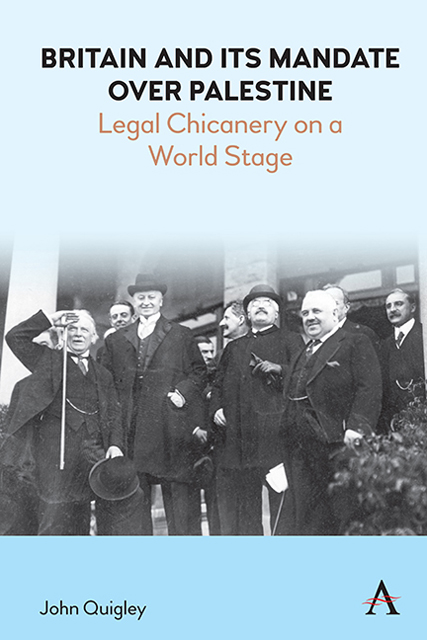Book contents
- Frontmatter
- Contents
- Preface
- Setting the Stage: Was Britain’s Rule in Palestine Legal?
- 1 The Balfour Declaration Is the Focal Point for the Legal Situation of Palestine
- 2 The Balfour Declaration Was a Binding Commitment to the Jewish People
- 3 The Jewish National Home Meant a Jewish State
- 4 The Balfour Declaration Was Issued to Affirm Jewish Rights in Palestine
- 5 The Paris Peace Conference Raised Jewish Statehood to the International Level
- 6 Britain’s Allies Made the Balfour Declaration an International Commitment
- 7 Britain’s Allies Endorsed Jewish Rights
- 8 Britain Took on Palestine Because of the League’s Mandate System
- 9 The League of Nations Protected Palestine’s Arab Population
- 10 Britain Was Given Palestine by the League of Nations
- 11 The League of Nations Put the Palestine Mandate into Legal Force
- 12 The Peace Treaty with Turkey Legalized Britain’s Status in Palestine
- 13 The Palestine Mandate Document Was a Treaty between Britain and the League
- 14 The League of Nations Required Britain to Implement the Balfour Declaration
- 15 The Palestine Mandate Document Implemented the League Covenant
- 16 The Palestine Mandate Document Recognized Jews as a National Group
- 17 The Palestine Mandate Document Bound Britain to the Balfour Declaration
- 18 The International Community Committed Itself to the Balfour Declaration
- 19 Britain Held Legal Status in Palestine
- 20 The United Nations Charter Carried Forward a Jewish Entitlement to Statehood
- Postscript: Why History Matters
- Documents Annex
- Notes
- Bibliography
- Index
5 - The Paris Peace Conference Raised Jewish Statehood to the International Level
Published online by Cambridge University Press: 10 January 2023
- Frontmatter
- Contents
- Preface
- Setting the Stage: Was Britain’s Rule in Palestine Legal?
- 1 The Balfour Declaration Is the Focal Point for the Legal Situation of Palestine
- 2 The Balfour Declaration Was a Binding Commitment to the Jewish People
- 3 The Jewish National Home Meant a Jewish State
- 4 The Balfour Declaration Was Issued to Affirm Jewish Rights in Palestine
- 5 The Paris Peace Conference Raised Jewish Statehood to the International Level
- 6 Britain’s Allies Made the Balfour Declaration an International Commitment
- 7 Britain’s Allies Endorsed Jewish Rights
- 8 Britain Took on Palestine Because of the League’s Mandate System
- 9 The League of Nations Protected Palestine’s Arab Population
- 10 Britain Was Given Palestine by the League of Nations
- 11 The League of Nations Put the Palestine Mandate into Legal Force
- 12 The Peace Treaty with Turkey Legalized Britain’s Status in Palestine
- 13 The Palestine Mandate Document Was a Treaty between Britain and the League
- 14 The League of Nations Required Britain to Implement the Balfour Declaration
- 15 The Palestine Mandate Document Implemented the League Covenant
- 16 The Palestine Mandate Document Recognized Jews as a National Group
- 17 The Palestine Mandate Document Bound Britain to the Balfour Declaration
- 18 The International Community Committed Itself to the Balfour Declaration
- 19 Britain Held Legal Status in Palestine
- 20 The United Nations Charter Carried Forward a Jewish Entitlement to Statehood
- Postscript: Why History Matters
- Documents Annex
- Notes
- Bibliography
- Index
Summary
The Paris Peace Conference afforded an opportunity for the Zionist Organization to explain its reasons for a Jewish national home. Israeli historian Tom Segev called the peace conference “the pinnacle of Weizmann's diplomatic achievements.” Segev wrote that Weizmann “managed to ensure that the British would remain in Palestine.” Segev explained Weizmann's success: “Weizmann, at the head of the Zionist delegation, pleaded for the international ratification of the Balfour Declaration. As a result, the League of Nations agreed to grant a mandate to the British, empowering them to govern Palestine, that included an explicit responsibility to help the Jews establish a national home in the country. The mandate was Weizmann's own personal achievement.”
Segev's assessment reflects what the Narrative came to reflect, that the Zionist Organization succeeded at the Paris Peace Conference in convincing the world to promote its objectives. The reality was far different. In Paris, the Zionist Organization did not move the international dial on the topic of Zionism. Nor did it ensure that Britain would remain in Palestine. Britain had its own reasons for doing so. Neither did it gain agreement from the League of Nations, which was not yet in existence. And when the League did address Palestine, as we shall see, it did not empower Britain to govern there or to promote a Jewish national home.
Weizmann gave himself less credit than did Segev for his performance in Paris. In his memoir, Weizmann, who was not known for understating his own successes, could find nothing more positive to say about his achievements in Paris than that the Zionist participation resulted in some “good press in France.”
The invitation issued to the Zionist Organization to make a statement at the Paris Peace Conference did afford it a chance to state its case in a forum that could shape events. The major powers were gathered to arrange peace with Germany and Turkey and to make decisions about territory being taken from them. The Zionist Organization made both a written and an oral presentation.
In its written plea, the Zionist Organization laid out a plan for Britain to control Palestine, quite a bold move for a non-governmental organization.
- Type
- Chapter
- Information
- Britain and its Mandate over PalestineLegal Chicanery on a World Stage, pp. 29 - 36Publisher: Anthem PressPrint publication year: 2022

